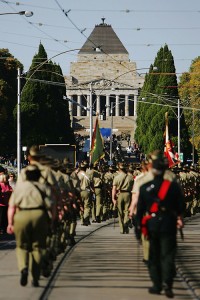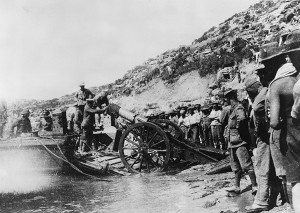Anzac Day
Monday, April 25th, 2022
Soldiers take part in a memorial service during an Anzac Day event. Anzac Day is a patriotic holiday in Australia and New Zealand that honors people who served in the armed forces.
Credit: © Kristian Dowling, Getty Images
Today, April 25, is Anzac Day, a patriotic holiday honoring current and former members of the Australian and New Zealand armed forces. ANZAC stands for the Australian and New Zealand Army Corps, the name of the combined overseas force that fought in World War I (1914-1918). Anzac Day marks the anniversary of the Allied invasion of Turkey’s Gallipoli Peninsula on April 25, 1915.
In World War I, the Central Powers—Germany and Austria-Hungary—fought against the Allies—an alliance that included the United Kingdom, France, and Russia. As the war progressed, additional countries joined each alliance. Australia and New Zealand, former British colonies, entered the war as allies of the United Kingdom. Allied soldiers from the United Kingdom, France, Australia, New Zealand, and elsewhere fought troops of the Ottoman Empire, which was aligned with the Central Powers, at Gallipoli. The Ottoman Empire, centered in what is now Turkey, entered the war as a German ally in October 1914.

The ANZAC became known for the bravery and skill of its soldiers fighting against the Ottoman Empire during World War I (1914-1918). ANZAC forces landed on the Gallipoli Peninsula, in Turkey, in an area later called Anzac Cove, shown here. After many months of hard fighting, the troops were withdrawn, and the campaign at Gallipoli failed.
Credit: © Bettmann/Corbis
On April 25, 1915, some 75,000 soldiers from Australia, France, New Zealand, and the United Kingdom landed on Gallipoli Peninsula in Turkey. At that time, it was the largest military landing in history. The campaign was a costly failure for the Allies, who left Gallipoli after eight months of brutal and fruitless warfare. Some 127,000 people from all nations died there.
The campaign was particularly hard for ANZAC forces. More than 8,000 Australian soldiers were killed in action during the Gallipoli campaign. More than 19,000 Australian soldiers were wounded. More than 2,700 New Zealanders were killed, and more than 4,700 were wounded. During the campaign in Gallipoli, the ANZAC forces gained a reputation for bravery and skill. In Australia and New Zealand, Anzac Day is observed each year on April 25 in honor of people who have served in the armed forces of the two countries.
On April 25, 1916, services in Australia and New Zealand marked the first Anzac Day to remember the fallen of Gallipoli. Today, Anzac Day services are held throughout Australia and New Zealand, as well as at Gallipoli’s “Anzac Cove.” For the last two years, services and celebrations have been limited due to the COVID-19 pandemic. Many people stood out on their driveways to safely honor the armed forces. This year, traditional dawn services and marches will resume. In Sydney, the dawn service begins at 4:30 a.m. at the Cenotaph in Martin Place, where many young men enlisted to fight in World War I. Cenotaph means empty tomb. War memorial cenotaphs honor soldiers whose bodies lie elsewhere. The solemn service includes a reading of the “Ode of Remembrance,” part of the poem “For the Fallen” written by British poet Laurence Binyon soon after the outbreak of war in 1914:
“They shall grow not old, as we that are left grow old;
Age shall not weary them, nor the years condemn.
At the going down of the sun and in the morning
We will remember them.”
The audience then responds: “We will remember them.”
Later in the day, veterans and current service members march from Martin Place towards Hyde Park, where the Anzac Memorial is located. National ceremonies begin a few hours later in Canberra and Wellington, the capital cities of Australia and New Zealand.



